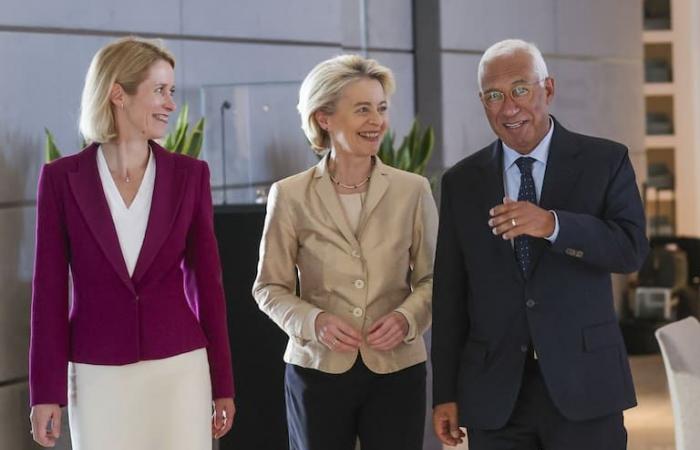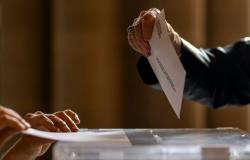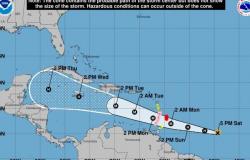Hear
PARIS.- White smoke came out of Brussels yesterday On the first day of the European Council, the heads of state and government of the Union agreed to give Ursula von der Leyen a second term as president of the Commissiona key position in the distribution of “top jobs” of the EU. A decision described as “surreal” by the marginalized Italian Giorgia Meloni and his far-right associates.
The German conservative, who is considered by many to be a “unusual strategist and the most powerful woman in Europe”, must still be confirmed by the European Parliament in July, like the Estonian Prime Minister Kaja Kallas, proposed as head of European diplomacy. A determined adversary of the Kremlin, the 47-year-old liberal will succeed the Spaniard Josep Borrell.
EU leaders also appointed Portuguese socialist Antonio Costa as president of the European Council, a body that brings together the bloc’s 27 heads of state and government. While another conservative, lMaltese Roberta Metsola appears to be the favourite to also obtain a second two-and-a-half-year term as President of the European Parliament.in mid-July in Strasbourg.
“It is surreal that the names of the main EU positions are decided without even pretending that one takes into account the vote of the voterss”, declared the Italian Prime Minister shortly after the start of the European Council, which between yesterday and this Friday was to decide the key positions of the new Commission.
Meloni’s anger crystallizes the tensions surrounding this crucial exercise for the next five years in the bloc. While six European leaders of the majority parties (the Polish Donald Tusk and the Greek Kyriakos Mitsotakis for the conservative European People’s Party (EPP); the German Olaf Scholz and Spanish Pedro Sanchez by the social democrats and the French Emmanuel Macron and the dutch Mark Rutte by the liberals of Renew) announced their support for a “package of nominations”, which included Von der Leyen, the Italian leader denounced a “absence of democracy”.
At the center of the controversy, the recent results of the European elections. Von der Leyen’s EPP was the big winner with 189 seats, although it is true that Parliament has moved even more to the right with the advance of the ultra-right to which Meloni belongs. But, although his group, the European Conservatives and Reformists (CRE), won deputies (83) becoming the third political force ahead of the liberals and centrists of Renew (74), his group is decidedly in the minority compared to the great alliance of the three parties that have governed Parliament for decades.
“Some claim that citizens are not intelligent enough to make certain decisions and that ‘oligarchy’ is the only acceptable form of democracy“But I do not agree,” Meloni insisted on the eve of the summit. The Italian prime minister accused EU leaders of wanting to “sweep the dust under the carpet” instead of acknowledging the discontent of voters.
AND Giorgia Meloni He is not content with criticising, but makes precise demands: a top economic portfolio for Italy in the next Commission, and an executive vice-president postAs the bloc’s third largest economy, Italy will certainly gain a significant portfolio.
“There is no reason for Von der Leyen to forget about Meloni. However, the President of the Commission has not yet promised anything. She has not promised any member country“, says a senior Brussels official. An argument that is hard to believe for those who know the workings of the European executive.
But, fine politics, Meloni exaggerates the provocation a little when he demands to have a commissioner who is in charge of limiting the EU “bureaucracy”if one takes into account the extent to which Italy, due to its own bureaucracy, fails to comply with the stages required to receive their part of the gigantic reactivation plan – with 196 billion euros, Italy is the main beneficiary – decided by the bloc after the pandemic.
Like Giorgia Meloni, also the Hungarian ultra-nationalist prime minister Viktor Orbanwhich aims to have more weight in the future orientation of the European executive, described “shameful” the decision to grant that second mandate to Von der Leyen without taking them into account.
Faced with these criticisms, defenders of the current process highlight the complexity of the exercise.
“Putting together the Commission’s leadership team is a real puzzle”the same European source confides. “We must take into account geographical and political balances, between men and women, while reflecting at the same time the new political realities that have emerged from the ballot boxes,” he adds.
As mentioned above, Giorgia Meloni’s party, Fratelli d’Italia, is not part of the majority tripartite parliamentary coalition (EPP, SD and Renew). By placing herself alongside the pro-independence parties, outside the centre-left and centre-right, the Italian prime minister thus weakens her position in the distribution of the EU’s “top jobs”. And since these positions are formally allocated by qualified majority, Meloni and Orban have no way to block the appointment. That said, good customs make it the consensus that prevails among the 27.
The problem actually goes deeper and Ursula von der Leyen’s campaign promise makes this explicit: “I will do everything possible to stop the far right”he promised. Democratic European leaders know that, for the first time in their history, the idea of a Europe as a supranational union between 27 countries based on the rule of law and the principles of liberal democracy, is threatened by the advance of another model: the alternative project of the extreme right, who denies the existence of a “European people” and proclaims himself descendant of a mythological and secular Europe “of Athens and Rome.”
Its objective is to create an alliance of nations based on the identity of the peoples and the voluntary cooperation of the States, which thus recover all aspects of their respective sovereignties. In other words, it is about making the Union disappear and replacing it with a space for free cooperation between sovereign nations.which will regain absolute control over its politics, economy and defence. A project unimaginable for most of the continent’s pro-Europeans.
Beyond the future members of the Commission, the European Council which concludes this Friday was to adopt “the strategic agenda” of the mandate. A multi-page document still under discussion, the axes of which will define the reinforcement of common defence and security, the reactivation of economic and industrial competitiveness, the protection of democracy and fundamental rights, as well as the adoption of a more pragmatic and flexible strategy in the implementation of the Green Deal.






